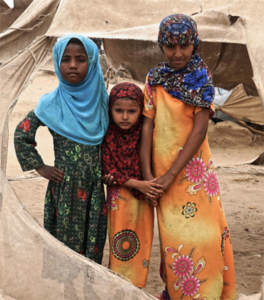COVID focus masking global humanitarian crises
The United Nations’ World Humanitarian Day passed with little fanfare recently, with the world’s focus firmly on the COVID-19 pandemic.
But, lurking beneath the global preoccupation with the pandemic is a frightening statistic that a record number of people will need humanitarian help worldwide during 2020.
 A record 168 million people worldwide will need help and protection in crises spanning more than 50 countries in 2020, the UN’s emergency relief chief Mark Lowcock said, in an appeal for nearly $US29 billion in humanitarian aid from donors.
A record 168 million people worldwide will need help and protection in crises spanning more than 50 countries in 2020, the UN’s emergency relief chief Mark Lowcock said, in an appeal for nearly $US29 billion in humanitarian aid from donors.
That represents about one person in 45 on the planet and is the highest figure in decades.
Conflict in Yemen, Syria, DR Congo, the Sahel, and elsewhere is driving food shortages and displacement of people; the UN estimated that 80 per cent of Yemenis require urgent humanitarian aid, according to the UN’s latest Humanitarian Overview.
Deepening economic crises, such as in Venezuela, are causing hunger and mass migration, and climate change is increasing the risk of natural disasters, famine, and drought, the report says.
There were 79·5 million forcibly displaced people by the end of 2019, and access to health care is often poor in these settings; 80 per cent of all refugees live in low-income and middle-income countries with weak health systems.
Another disturbing trend is that armed conflicts “are killing and maiming a record number of children”, Mr Lowcock said.
“More than 12,000 in fact were killed or maimed in conflict in 2018, and 2019 has been worse.”
In addition, women and girls were at higher risk of sexual and gender-based violence than in the past, and one in five people living in conflict areas has a mental health condition, he said.
And COVID-19 is exacerbating the inequalities faced by individuals and families in humanitarian crises, the UN says.
With national governments looking inwards and putting their own citizens first, people in need of humanitarian assistance are being neglected, it says.
As the COVID-19 pandemic has spread, governments worldwide have introduced travel restrictions, inadvertently stopping aid workers from travelling, and hampering humanitarian relief efforts.
In some cases, aid workers already in-country cannot deliver vital services because of government restrictions aimed at protecting their own citizens, the UN report says.
In Greece migrants are under strict lockdown regulations as the rest of the country returns to normality, limiting their access to basic services.
Amnesty International says the risk of starvation in some refugee camps because of a lack of access to aid may become a bigger threat than the virus itself.
An interruption of aid means even less access to medicines and hygiene, vital for controlling the spread of COVID-19.
Other interventions such as social distancing and masks are problematic in many humanitarian settings.
The report cites Cox’s Bazar, in Bangladesh, has a population density of 40 000 people per square kilometre, 40 times the ratio of the country as a whole.
“Isolating confirmed cases is extremely difficult under these circumstances, and personal protective equipment is often difficult to obtain because countries have introduced export restrictions,” the report says.
Human rights advocates say governments are using the pandemic as an excuse to advance anti-migrant agendas under the flimsy pretext of protecting their citizens from COVID-19.
The US has suspended refugee and migration programs despite having more COVID-19 cases peer capital that the rest of the world.
In Bosnia, reports say, authorities have cut off the water supply to migrant populations to force them to move on.
The UN report says humanitarian organisations are responding and developing new ways of working but also that they cannot succeed unsupported.
The UN’s relief arm UNOCHA says its global COVID-19 humanitarian response plan will cost $US10.3 billion, but so far only 20 per cent has so far been pledged.
In contrast, in just two months, governments across the globe spent $US10 trillion on economic stimuli for their own economies.
COVID-19 will present even more health burdens in humanitarian settings, the UN report says, and international disputes over resources have, in some cases, left people in these settings without support.
The report urged states to remember that other humanitarian crises around the world have not diminished, and are being exacerbated by COVID-19.
“True concern for inequality demands attention to all the world’s humanitarian needs,” it says.
See the full UN Humanitarian Overview here: https://news.un.org/en/story/2019/12/1052731












